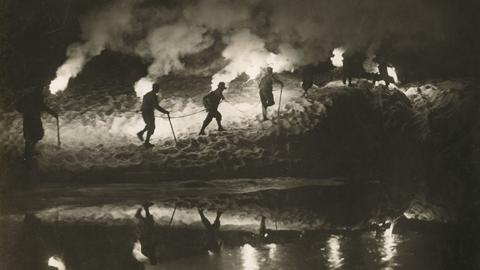
James Harrison
on Fri 4 Oct 2019Weimar Sundays
Posted on Fri 4 Oct 2019
James Harrison, co-director of South West Silents and co-curator at Cinema Rediscovered, discusses the rationale behind the Weimar Sundays season throughout October 2019.
2019 marks 100 years since the establishment of the Weimar Republic. Set between the turmoil of both the First World War and the foundations of what would lead to the beginning of the Second World War, it was an unforgiving era. An era that brought about a chaotic democratic system, a divided society, economic uncertainty and revolutionary chaos onto the streets of Germany; all of which would culminate with the rise of the National Socialist Party.
And yet, out of this unsettling and unstable time came a flourish of expressionistic work that re-validated the concept of art in a post-war Europe. At the forefront of this new wave was the world’s newest medium, ‘the film’. But while a handful of films made by the German film industry during this time have now become key titles for the study of silent film (and film in general), such as Das Cabinet des Dr. Caligari (The Cabinet of Dr. Caligari, 1920), Nosferatu, eine Symphonie des Grauens (Nosferatu: A Symphony of Horror, 1922), and Metropolis (1927), there is far more to the films of the Weimar Republic than just these usual suspects.
From the surrealism found within expressionism many German filmmakers began to develop their observations of Germany’s social and economic tensions into more realist films that commented directly on what was happening in the streets. It is these less well known films that make up our Weimar Sunday season at Watershed (Sunday 6th until Sunday 27th October).
Out of the four titles that make up Weimar Sundays, Menschen am Sonntag (People on Sunday) is probably the most well-known (Sun 6th Oct, 12:00). Newly restored thanks to the Eye Institute in the Netherlands and the Deutsche Kinemathek, Berlin; Robert Siodmak & Edgar G. Ulmer’s fictional observation of the timeless lives of four twenty-year-olds set in front of late 1920s Berlin is a perfect starting block for Weimar Sundays. Beautifully shot by Eugen Schüfftan (Metropolis), Menschen am Sonntag offers a rare glimpse of the real Weimar era German capital. It is a centrepiece on what the Republic was able to achieve before Nazis came to power. The film also marked the start of the film careers of six celebrated names in the later history of cinema: Billy Wilder, Robert and Curt Siodmak, Edgar G Ulmer, Eugen Schüfftan and Fred Zinneman. All of which would leave Germany during the Nazification of Germany.
Made within the first year of the Weimar Republic, Robert Reinert’s Opium (Sun 13th Oct, 12:00) is an exotic, erotic tale of addiction which hints at the clashes of societies as Germany (and the rest of the world) tries to recover from the impact of a world war. This sensational silent drama, made during the early censorship-free period, warns against the perils of drug addiction and sexual debauchery. Perfect then for a Sunday afternoon at the cinema!
The subject of society and individuality continues with G. W. Pabst’s very much forgotten Abwege (Sun 20th Oct, 12:00) where we follow neglected wife Irene (Brigitte Helm), as she delves into the whirling world of luxury and vice; an unchained story that that lays out drug use and prostitution within the social bohemian life of a German metropolis. A forgotten treasure from the director of Die Büchse der Pandora (Pandora’s Box, 1929), Abwege is a film worth discovering.
We leave the city, for the mountains, for our final outing of Weimar Sundays with the beautifully shot Der Kampf ums Matterhorn (Sun 27th Oct, 12:00). Now, the reason that we leave the city behind is to give us the chance to showcase a lost genre within the pre-war era of the German film industry, the ‘mountain film’. Out of all of the films which came from the genre Arnold Fanck’s Der heilige Berg (The Holy Mountain, 1926) is probably the best known. But you get more out of Matterhorn than you do with Franck’s earlier film; a fun thriller set in front of the striking compositions of the Alps with extensive sequences of great realism and naturalism, infused, with nail-biting suspense.
As with all South West Silents’ silent film screenings, we have sourced the best digital prints from European archives and have the best live silent film pianists the world can offer. South West Silents’ and Bristol Festival of Ideas’ Festival of the Future City season on the films of the Weimar Republic continues with special screenings of Der Golem, wie er in die Welt kam (The Golem: How He Came into the World,1920) at the Curzon Cinema, Clevedon (Wed 23rd October, 19:30) and will conclude with a screening of the 4K restoration of Paul Leni’s The Man Who Laughs (1928) with live music by Meg Morley.
This season is a collaboration between South West Silents, Bristol Festival of Ideas, Cube Cinema, Curzon Cinema and Arts and Watershed celebrating the films of the Weimar Republic as well as the ‘City and Silent Film’. These two seasons run through October and November 2019 as part of the Festival of the Future City 2019.

